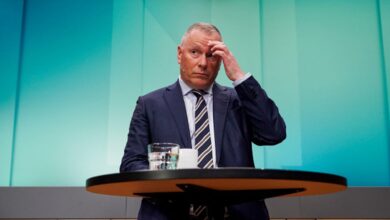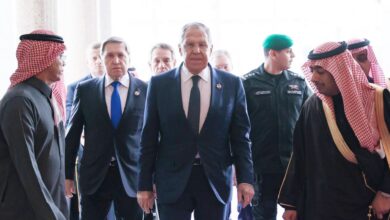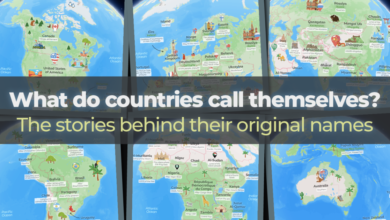The genocide has left me feeling like a stranger in my own homeland | Israel-Palestine conflict

I was born and raised in Bani Suhaila, a town of 40,000 people in the Khan Yunis governorate in Gaza. It was a place where everyone knew each other. We lived in a large house surrounded by my extended family and fields planted with olive and fruit trees. Our close-knit community provided a feeling of safety and comfort.
Fifteen months of continuous war destroyed this sense of belonging. My family and I have been forcibly displaced several times already, and even though we are still inside Gaza, inside Palestine, I feel like a stranger.
In December 2023, we had to leave our home for the first time. We fled to what Israel claimed was a “safe area” in the Al-Mawasi area of Khan Yunis. It was complete chaos when we arrived, and we struggled to secure a small spot in the sand to pitch a tent.
We were surrounded by people we didn’t know. Palestinians from all over Gaza fled to the area. As I walked around the camp, all I saw were unfamiliar faces. People looked at me with mysterious looks as if they were silently asking me: Who are you, stranger?
Al-Mawasi was a beach that my friends and I loved to go to to relax. It was sad to see it turn into a displacement camp full of people grieving the loss of their homes and loved ones.
By February, we had to flee to Rafah. After the Israeli occupation issued forced displacement orders to various parts of the Gaza Strip, one million homeless people flocked to the southern city. We were among them.
Its streets and public places were crowded with displaced people who set up tents wherever they found space. However, the place seemed to me like a desert: barren and inhospitable.
My family and I lived in a tent in constant misery like the rest of the displaced. Every day I wandered the city’s alleys, hoping to find food to buy – if I could afford it. Many times I would come back empty-handed.
Sometimes, I would meet someone I knew – a friend or relative – who would bring me moments of joy followed by deep sadness. The joy came when they discovered they were still alive, but it quickly turned to sadness when they told me that another person we knew had been martyred.
My friend or relative is bound to comment on my significant weight loss, my pale features, and my weak body. They often admitted that they did not recognize me at first glance.
I return to my tent with a tightness in my chest, and a feeling of alienation overwhelms me. Not only was I surrounded by strangers, but I also became a stranger to those who knew me.
The suffering of the displaced was continuous and unbearable. It was preceded only by news of new forced displacement, which usually came in the form of leaflets dropped by Israeli warplanes above us. We hurried to collect our luggage, because we knew that these planes would soon return, not with more leaflets, but with more bombs.
In April, the Israelis dropped leaflets telling us that we were forced to leave Rafah. We fled with a small bag carrying our few possessions and the burden of everything we had endured: hunger, fear, and the pain of losing our loved ones.
We returned to Khan Yunis – to the western part that Israel claimed was “safe” – to find the place destroyed and devoid of any signs of life. All roads, shops, educational institutions and residential buildings were reduced to rubble.
We had to pitch our tent next to the destroyed houses. I wandered the streets, staring in amazement at the extent of the destruction caused by the Israeli occupation. I no longer recognized the city I used to visit so often with my friends.
In August, for the first time since the war began, I was able to reach our neighborhood in Bani Suhaila, east of Khan Yunis. I thought the feelings of alienation would end there, but they didn’t.
I walked among people I knew and those who knew me, but the strange looks continued—not because they didn’t recognize me, but because I looked much worse than they had ever seen me before. They looked at me in amazement, as if I had become another person. Their looks only deepened my feelings of alienation, loneliness, and loss.
I struggled to understand the devastation and disappearance of all the places and landmarks that once defined my hometown. The house I grew up in was reduced to ashes as a result of a massive fire caused by the bombing. The inside was full of rubble, and our belongings were reduced to what looked like lumps of coal.
Today, after 15 months of war, we are still displaced. Everywhere I go people ask me: “Hey displaced person, where are you from?” Everyone looks at me strangely. I lost everything, and all I had left was the one thing I wanted to get rid of throughout this war: the feeling of alienation. I have become a stranger in my own country.
The opinions expressed in this article are those of the author and do not necessarily reflect the editorial position of Al Jazeera.
https://www.aljazeera.com/wp-content/uploads/2025/01/2025-01-07T184108Z_1813636113_RC2Z4CA1A09W_RTRMADP_3_ISRAEL-PALESTINIANS-HAMAS-HOSTAGES-1736938296.jpg?resize=1920%2C1440
2025-01-15 11:14:00





